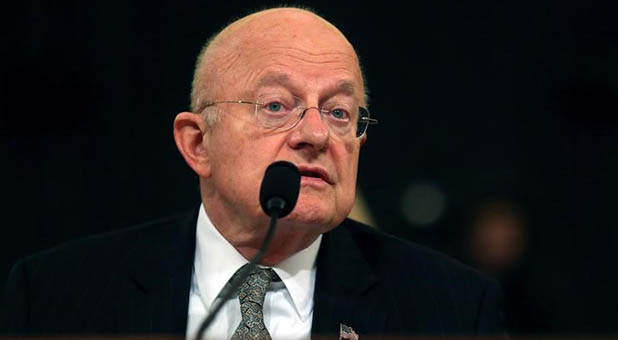Director of National Intelligence Declares ‘Profound Dismay’ Over Leak of the ‘BuzzFeed Dossier’
We now know the lengths those who opposed President-elect Donald Trump were willing to go to stop him from winning on Nov. 8, and how far they’re willing to go to undermine and de-legitimize his presidency.
Following BuzzFeed’s publication of a review of the now-debunked 35-page “dossier” that alleges a number of vile and ugly acts on the part of the president-elect, and the subsequent blasting the online alternative news source took as a result, Director of National Intelligence James Clapper reached out to Trump. He then released a statement about the phone call in which he disavowed any involvement by the U.S. intelligence community (IC).
The statement reads:
This evening, I had the opportunity to speak with President-elect Donald Trump to discuss recent media reports about our briefing last Friday. I expressed my profound dismay at the leaks that have been appearing in the press, and we both agreed that they are extremely corrosive and damaging to our national security.
We also discussed the private security company document, which was widely circulated in recent months among the media, members of Congress and Congressional staff even before the IC became aware of it. I emphasized that this document is not a U.S. intelligence community product and that I do not believe the leaks came from within the IC. The IC has not made any judgment that the information in this document is reliable, and we did not rely upon it in any way for our conclusions. However, part of our obligation is to ensure that policymakers are provided with the fullest possible picture of any matters that might affect national security.
President-elect Trump again affirmed his appreciation for all the men and women serving in the intelligence community, and I assured him that the IC stands ready to serve his administration and the American people.
But if the dossier wasn’t produced by the intelligence community, and it wasn’t leaked by the intelligence community, there are only two options for who could have gotten those documents in the hands of the media: Republican opponents or Democratic opponents. According to CNN’s reporting on the documents, it “originated as opposition research, first commissioned by anti-Trump Republicans and later by Democrats.”
To translate, “anti-Trump Republicans” means the likes of former Florida Gov. Jeb Bush, former Massachusetts Gov. Mitt Romney and U.S. Sens. Lindsey Graham (R-S.C.) and John McCain (R-Ariz.). “Democrats” means the Hillary Clinton campaign.
The CNN report continues:
Some of the memos were circulating as far back as last summer. What has changed since then is that U.S. intelligence agencies have now checked out the former British intelligence operative and his vast network throughout Europe and find him and his sources to be credible enough to include some of the information in the presentations to the president and president-elect a few days ago.
On the same day that the president-elect was briefed by the intelligence community, the top four Congressional leaders, and chairmen and ranking members of the House and Senate intelligence committees—the so-called “Gang of Eight”—were also provided a summary of the memos regarding Mr. Trump, according to law enforcement, intelligence and administration sources.
The two-page summary was written without the detailed specifics and information about sources and methods included in the memos by the former British intelligence official. That said, the synopsis was considered so sensitive it was not included in the classified report about Russian hacking that was more widely distributed, but rather in an annex only shared at the most senior levels of the government: President Obama, the President-elect and the eight Congressional leaders.
McCain has since attempted to paint his involvement as civil responsibility, saying he couldn’t verify the information he had obtained in December was accurate, so he sent it to the FBI. The FBI was already in possession of the documents in August, according to media reports.
But what is also missing from CNN’s reporting is that much of what was contained in the dossier had been shared with the mainstream media as early as the fall of 2015, making the timing of its release certainly suspect. Both CNN and BuzzFeed continue to claim their reporting was based on sound journalistic principles. {eoa}














































